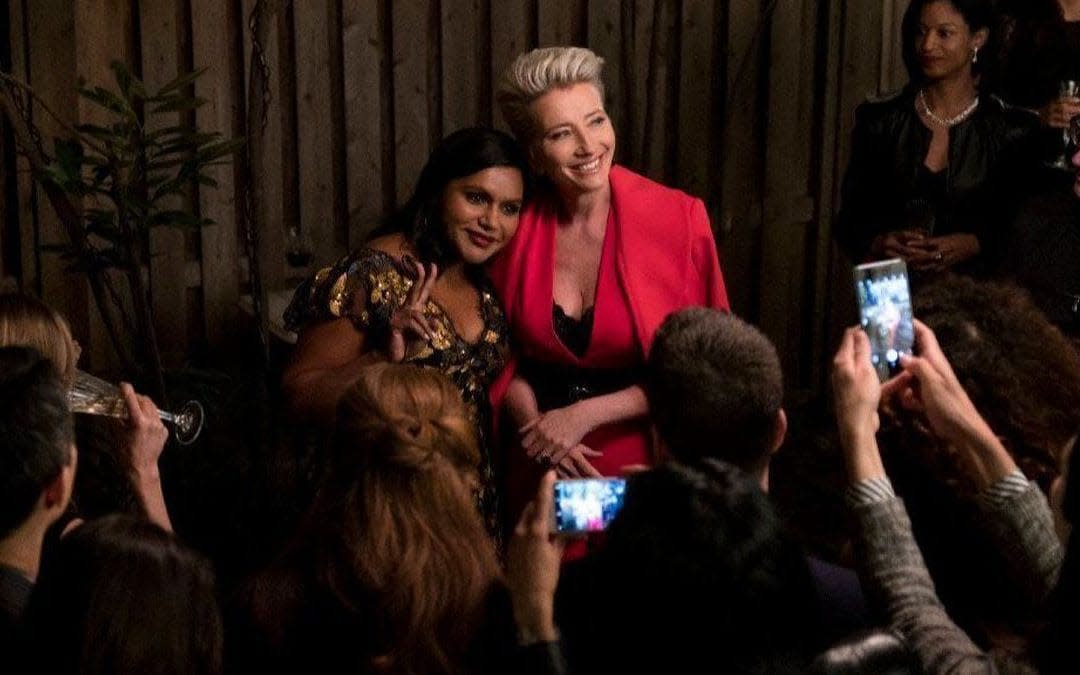Late Night review: watchable talk show comedy denies Emma Thompson her Miranda Priestley moment

Dir: Nisha Ganatra. Cast: Emma Thompson, Mindy Kaling, Hugh Dancy, John Lithgow, Ike Barinholtz, Amy Ryan, Denis O’Hare, Megalyn Echikunwoke, Seth Meyers. 15 cert, 102 mins
Wanting to like Late Night is the easy part. It’s been years since Emma Thompson took a lead role in a mainstream American comedy, and as weary talk-show host Katherine Newbury – the only woman on air, but a character battle-scarred from years of doing it – she ought to be stealing the show with the same jaded flair Meryl Streep had in The Devil Wears Prada.
It’s a comparison this glibly watchable film is desperate to earn and doesn’t. The fearsome boss to a floundering new female employee (Mindy Kaling), Katherine gets a chic shock of white hair that’s just as Miranda Priestly-ish as her imperious air of knowing better in all situations. Her eight-strong writing staff, many of whom she’s never even met, are all men, thrashing out the show’s increasingly lame jokes around a table that reeks of just-for-the-pay-cheque complacency.
Alas, a ratings slide proves it’s no longer working, so in steps Kaling’s Molly Patel, the go-getting new recruit, lately a chemical plant’s efficiency expert, who joins the team to turn things around – ideally breathing life back into the format before the network chief (Amy Ryan) forces Katherine to step aside.
Kaling’s geniality gives the film more than enough well-meaning warmth to fall back on, which lets it breeze across some rough spots – not exactly plain sailing, but it’ll have to do. Her script certainly presses topical buttons – it’s bright, lively, difficult to argue with.
Molly, whose male colleagues first assume she’s some kind of tea lady, is constantly having to prove she’s more than a diversity hire, while Katherine combats the pandering, jockish humour of an unfunny younger rival (Ike Barinholtz) and generally resists the industry’s institutional ageism, especially where women are concerned.
You could say the film has strong optics – steer clear if you don't even want to root for Thompson and Kaling together, a theoretical fighting force bringing comedy up to date in a post-Time’s Up world. The comedy, though, is the problem. Molly’s genius for woke jokes is supposed to make her the show’s new secret weapon, but these barely land with more impact than the old ones. There’s a bit she writes about Republican senators not getting laid – meant to be so edgy Katherine has second thoughts about delivering it – which would meet with an absolute kersplat on any actual talk show in 2019.
There’s something weird about tackling such a male-dominated TV format by putting a rogue woman in the hot seat here, as the exception who proves the rule, and then making her quite so obviously terrible at it. Katherine is above her audience, disconnected from the issues of the day, sneers at her guests and doesn’t seem to know a killer joke from her elbow.

If anything, Thompson’s top-of-the-class charisma only makes her less relatable, and she’s never all that credible as a female answer to John Oliver or Seth Meyers, who graces us with a cameo. It’s absolutely right that Ryan’s character would seek to fire her – silly, in fact, that she hadn’t dealt with it years ago. And Katherine never acknowledges the fact that she’s lost whatever touch she once had.
Her only route back into public favour is scandal and grovelling, baring her peccadilloes to the nation, in a overly moralistic final act which gives John Lithgow a drippy payoff scene as her all-forgiving husband. In a comedy whose decent jokes are this few and far between, thank heavens for Denis O’Hare, who takes his modest quips as Katherine’s harassed producer – roughly the Stanley Tucci role – and softly drops them with an old pro’s casual timing.
Late Night is an op-ed column where you shruggingly agree with every point and chuckle mildly at one or two.

 Yahoo News
Yahoo News 
